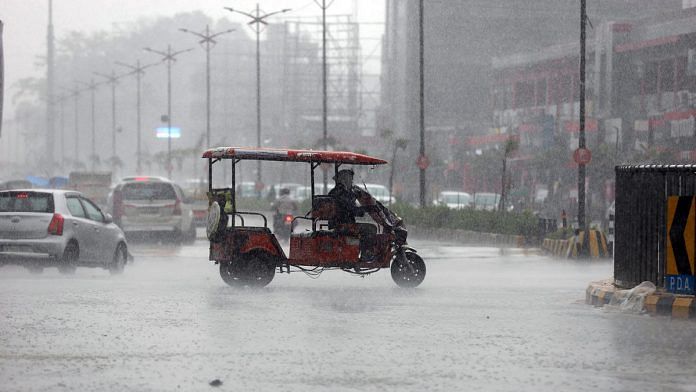New Delhi: Not many guidelines may change in ‘Unlock 2.0’, the second phase of reopening the country after the lockdown, except for the possible resumption of international flights.
Top sources in the Government of India told ThePrint that schools, colleges and cinema halls are likely to remain closed as there are apprehensions that the monsoon, which has now covered virtually all of India, could aggravate the spread of Covid-19.
These fears are despite the fact 80-85 per cent of India’s Covid-19 burden is concentrated in about 7.5 per cent of the districts — 55 out of 736 districts.
The guidelines for Unlock 2.0 are expected soon, as the first phase is supposed to end on 30 June.
Also read: Good monsoon rains expected to mitigate some impact of coronavirus on Indian economy
Can monsoon increase spread of Covid-19?
Concerns about the effect of the monsoon on Covid-19 have been conveyed to state governments, who have been asked to beef up primary care infrastructure. This is not just for Covid-19, but for usual seasonal spurts of cases in dengue and malaria, because their patients would come in with similar symptoms, ramping up the pressure on the infrastructure.
Dr V.K. Paul, member (health) at Niti Aayog, explained that one of the ways Covid-19 spreads is through droplet transmission through saliva and nasal fluids, which could increase during the monsoon.
“One paradigm of monsoon is that the droplet size will get bigger because of the humidity and it will evaporate more slowly. Although the final word on the role of weather and humidity is not known, we are very watchful right now because the conjecture is that humidity would help the droplet stay much longer,” Paul said.
“This could complicate matters. This is why states have been told to beef up primary care both for this and for rain-related diseases such as dengue and malaria.”
The effect of weather on Covid-19 has been a factor that policymakers around the world have been grappling with, ever since February when US President Donald Trump had raised hopes with his statement that heat is known to kill coronavirus. That turned out to be untrue, though research is still on to understand how the behaviour of the virus changes with weather.
However, a research letter published in the September 2020 (early release) issue of the Emerging Infectious Diseases journal of the US Centers for Disease Control and Prevention takes a position contrary to that of the Government of India — it says warmer and humid conditions might result in decreased transmission.
“Community transmission of SARS-CoV-2 is widespread and might be explained by contact with asymptomatic or presymptomatic infected persons. Because of the surface stability of SARS-CoV-2, fomite transmission might also play a role,” the letter, penned by researchers from the Joan C. Edwards School of Medicine at Marshall University, the National Institute of Allergy and Infectious Diseases, Montana State University and others, states.
“In addition, reduced surface stability of SARS-CoV-2 in human nasal mucus and sputum in warmer and more humid conditions might result in decreased virus transmission, and climatic influence on SARS-CoV-2 transmission rates might eventually drive seasonal outbreak dynamics in a postpandemic period, similar to other respiratory viruses (e.g., influenza A virus or human coronavirus OC43),”
Fomite transmission refers to the transmission of a virus from the surfaces of various objects; this is the reason why repeated hand washing/sanitisation is advised.
Also read: Dengue, H1N1, leptospirosis — the monsoon challenges Kerala faces besides coronavirus
International flights may resume, schools & colleges to stay shut
There are signs that international flights on select routes may open up — the Directorate General of Civil Aviation said Friday that even as scheduled flights remain suspended until 15 July, some may be allowed on a “case-to-case” basis.
However, schools, colleges and universities are “unlikely” to reopen, since there are deep reservations in the government at the moment, according to a senior government official.
“There is unlikely to be too much difference between Unlock 1.0 and Unlock 2.0. What other than schools, colleges and cinema halls are closed? Even malls are opening in some places. But we are not keen on making any sweeping changes,” the official added.
State governments, too, are learnt to be not keen on opening up educational institutions, which have been closed since March, and are now nearing what would normally be the end of the summer vacations.
“You cannot expose children,” said the official.
There may, however, be some changes in curfew timings. A call is yet to be taken on whether bars will open up.
Also read: India plans international air ‘bubbles’ after US restricts Air India’s Vande Bharat flights
80-85% burden in 55 districts
Officials say 80-85 per cent of India’s Covid-19 case load is concentrated in 55 districts, mainly in big cities like Delhi, Mumbai, Chennai, Hyderabad etc.
“In most districts, there is not much difference in people’s lives except the travel restrictions and the educational institutions. It is the 55 districts where the bulk of the disease burden is and where we are concentrating right now,” said another senior government official.
“The idea is to tackle the disease here and prevent it from spreading elsewhere.”
The central government has sent teams to Gujarat, Telangana and Maharashtra to take stock of the disease and “hand-hold” state governments.
Also read: Summer relief, Indian immunity & more — fact-check on 4 viral theories from early Covid days



